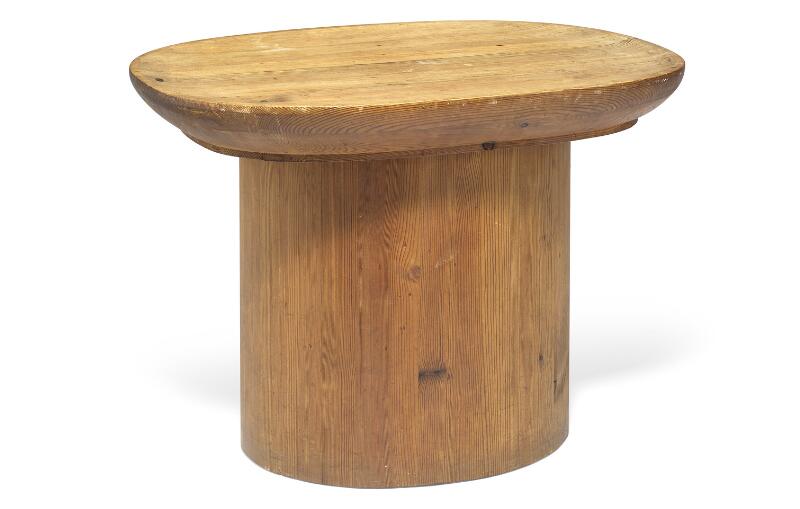71 Axel Einar Hjorth Unique cabinet 1937 Rosewood, rosewood-veneered wood, precious metal, glass. 135.8 x 95 x 47.1 cm (53 1/2 x 37 3/8 x 18 1/2 in.) Produced by AB Nordiska Kompaniet, Sweden. Reverse with two manufacturer’s metal labels impressed NK R 40281 - C and MADE IN SWEDEN.
Exhibited 'Exposition Internationale des Arts et Techniques dans la Vie Moderne', Paris, 25 May-25 November 1937 Literature Paris International Exhibition 1937, Arts and Crafts in Modern life: Sweden, Illustrated Official Guide, Paris, 1937, illustrated p. 56 Åke Stavenow, ed., Svenska Slöjdföreningens Tidskrift: Organ För Konstindustri Handverk Och Hemslöjd, no. XXXIII, 1937, Stockholm, illustrated p. 83 for an advertisement Christian Björk, Thomas Ekström and Eric Ericson, Axel Einar Hjorth: Möbelarkitekt, Stockholm, 2009, illustrated p. 69 Catalogue Essay This unique cabinet was executed on the occasion of the 1937, Paris World Exhibition (Exposition Internationale des arts et techniques dans la vie modern), shortly before leaving Nordiska Kompaniet to start his own business. The design was created for a clientele d’elite with a modern taste. Being Hjorth’s final exhibition with Nordiska Kompaniet the cabinet represents one of his last unique examples of a high standard from the architect. Axel Einar Hjorth was one of the most important Swedish architects and designers of his period. Hjorth for over a decade was the chief designer for Nordiska Kompaniet and addressed the company to a very selected elite clientele and continued the expansion of the company brand in the international market. Founded in 1902, the company was lead retailer of luxury products in the country. During these years as Chief Designer, Hjorth succeeded by increasing the company's popularity with consecutive and successful international exhibitions. These exhibitions were an important occasion to celebrate the craftsmanship and present high standard of products to an international market. Pavilions were intended to present the most refined and high quality furniture that the brand could produce, where only the most luxurious and refined pieces were displayed. One of Hjort’s most successful exhibition was at the 1929, Barcelona World Fair. For the occasion of this successful exhibition the architect designed the entire Nordiska Kompaniet pavilion, where he exhibited a selection of his famous ‘Cesar’ series. Read More
71 Axel Einar Hjorth Unique cabinet 1937 Rosewood, rosewood-veneered wood, precious metal, glass. 135.8 x 95 x 47.1 cm (53 1/2 x 37 3/8 x 18 1/2 in.) Produced by AB Nordiska Kompaniet, Sweden. Reverse with two manufacturer’s metal labels impressed NK R 40281 - C and MADE IN SWEDEN.
Exhibited 'Exposition Internationale des Arts et Techniques dans la Vie Moderne', Paris, 25 May-25 November 1937 Literature Paris International Exhibition 1937, Arts and Crafts in Modern life: Sweden, Illustrated Official Guide, Paris, 1937, illustrated p. 56 Åke Stavenow, ed., Svenska Slöjdföreningens Tidskrift: Organ För Konstindustri Handverk Och Hemslöjd, no. XXXIII, 1937, Stockholm, illustrated p. 83 for an advertisement Christian Björk, Thomas Ekström and Eric Ericson, Axel Einar Hjorth: Möbelarkitekt, Stockholm, 2009, illustrated p. 69 Catalogue Essay This unique cabinet was executed on the occasion of the 1937, Paris World Exhibition (Exposition Internationale des arts et techniques dans la vie modern), shortly before leaving Nordiska Kompaniet to start his own business. The design was created for a clientele d’elite with a modern taste. Being Hjorth’s final exhibition with Nordiska Kompaniet the cabinet represents one of his last unique examples of a high standard from the architect. Axel Einar Hjorth was one of the most important Swedish architects and designers of his period. Hjorth for over a decade was the chief designer for Nordiska Kompaniet and addressed the company to a very selected elite clientele and continued the expansion of the company brand in the international market. Founded in 1902, the company was lead retailer of luxury products in the country. During these years as Chief Designer, Hjorth succeeded by increasing the company's popularity with consecutive and successful international exhibitions. These exhibitions were an important occasion to celebrate the craftsmanship and present high standard of products to an international market. Pavilions were intended to present the most refined and high quality furniture that the brand could produce, where only the most luxurious and refined pieces were displayed. One of Hjort’s most successful exhibition was at the 1929, Barcelona World Fair. For the occasion of this successful exhibition the architect designed the entire Nordiska Kompaniet pavilion, where he exhibited a selection of his famous ‘Cesar’ series. Read More












Try LotSearch and its premium features for 7 days - without any costs!
Be notified automatically about new items in upcoming auctions.
Create an alert